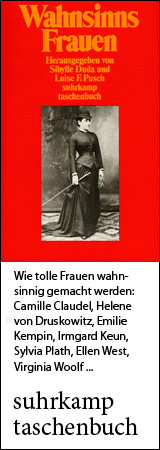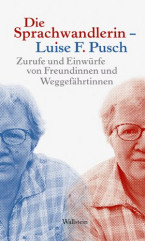Biographies Regine Hildebrandt

born April 26, 1941 in Berlin
died November 26, 2001 in Berlin
German politician (SPD) and biologist
20th anniversary of death on November 26, 2021
Biography • Quotes • Literature & Sources
Biography
The most striking thing about the politicians of the Federal Republic of Germany is that they seem strangely colorless and interchangeable. There are hardly any inspirational figures or role models among them.
Regine Hildebrandt was a woman who departed from this type in an appealilng way, as one who spoke plainly, stood up for her goals to the last, and consistently represented her views without shifting with every wind. For this, she was highly esteemed and revered, especially in the new German states: nicknames such as “Mother Courage of the East,” “Voice of the East” and “Avenger of the Disinherited” are eloquent testimony to this. Her non-conformist demeanor often made her a target for her political opponents, especially where she could not be met factually (e.g., Der Spiegel, June 1, 1998; Die Welt, April 26, 2001).
Regine Radischewski was born in Berlin on April 26, 1941. Her father was a pianist and répétiteur at the State Ballet School, her mother a housewife, later the owner of a small tobacco store. The family also included a brother four years older.
After graduating from high school in 1958, she studied biology at Berlin's Humboldt University from 1959 to 1964. In 1966 she married Jörg Hildebrandt, in 1968 she received her doctorate, and in 1969 the first of three children was born. From 1964 to 1978, Regine Hildebrandt was deputy head of the pharmacology department at VEB Berlin-Chemie, and subsequently division manager at the Central Office for Diabetes and Metabolic Diseases in Berlin (focusing on diabetes research) until 1990. She once described “job, family, friends, cathedral choir” as the “pillars of her life.”
With the fall of the Berlin Wall in 1989, Regine Hildebrandt realized that it was time to get involved in politics - after having been in opposition to the system in GDR times. Initially involved in the citizens' movement “Demokratie Jetzt,” she later joined the newly founded SPD and became a member of the GDR's first freely elected parliament: from April to August 1990, she was Minister of Labor and Social Affairs in the de Mazière cabinet.
From November 1990, Hildebrandt was Minister of Labor, Social Affairs, Health and Women of Brandenburg. In July 1996, her breast cancer became public. Soon after her operation, she returned to work in the ministry, despite continuing chemotherapy and radiation treatments. Her proactive approach to her illness and her unwavering commitment to the causes that were important to her gave courage to many women also affected by breast cancer.
In the 1999 state elections, Regine Hildebrand won her direct mandate again without a challenger, but the SPD lost its absolute majority. Hildebrandt spoke out in favor of a coalition with the PDS, but Minister President Stolpe opted for the CDU, which Hildebrandt had always found to be counterproductive. There was only one possible response, given Regine Hildebrandt's straightforward character: she resigned her seat in October 1999 and left the cabinet. The esteem in which she was held, especially in the new federal states, grew even more as a result – there were already too many politicians who had been able to switch course unabashedly at the drop of a hat.
In December 1999, Hildebrandt was re-elected to the SPD party executive.
After leaving the Brandenburg cabinet, she was a member of the SPD federal executive committee and the Forum East Germany, traveling in both new and old federal states to mediate politics, build bridges and promote mutual understanding.
In April 2001, she received congratulations from all over the world on her 60th birthday. Her cancer was already well advanced at that time. As throughout her life, she then went on the offensive: instead of hiding in her multi-generational house in Woltersdorf near Berlin, she gave interview after interview. She strongly supported the hospice movement and the possibility of active euthanasia in Germany.
In November 2001, one week before her death, she was re-elected to the SPD executive committee at the SPD party conference in Nuremberg with the strongest majority of any candidate.
Regine Hildebrand died on November 26, 2001, surrounded by her family in Berlin-Woltersdorf. Numerous honors and awards show how popular and respected Regine Hildebrandt was (e.g. Gustav Heinemann Citizen Award 1993, Hamm-Brücher Medal 1993, Solidarity Award 1997, Fritz Bauer Award 2000, Grand Cross of the Order of Merit of the Federal Republic of Germany 2001). For years, Germany's “Woman of the Year 1991” led opinion polls in Brandenburg as the most popular female politician.
Dr. Regine Hildebrandt published numerous scientific works, as well as political essays and treatises.
(Text from 2005)
Translated with www.DeepL.com/Translator (free version), edited by Joey Horsley.
Author: Almut Nitzsche
Quotes
Quotes by Regine Hildebrandt:
I was never really interested in politics. That only came about as a result of the fall of the Berlin Wall. It was my insight into the necessity that if anything is to be changed now, different people have to do it.
Do you know why it takes students in the West one year longer to graduate from high school than in the East? No? Please don't get angry: Because in the West there is one year of play-acting!
Just as it is natural to rejoice when a child is born, it must also be natural for people to accept death at the end of a fulfilled life. It is a matter of great concern to me that this is possible both in families with outpatient support and in the appropriate hospices.
At the federal level, it is important to improve the legal conditions so that people are not hooked up to machines when they no longer want to be. This also includes the right to suicide if life is no longer tolerable.
The same things have always been important to me. In GDR times, I tried to live the way I thought was right: with the pillars of job, family, friends, cathedral choir. (...) Empathy was always important to me. This even intensified after the fall of communism, because mass unemployment and the change in social conditions made people extremely insecure. My life is closely connected with my job, with being with my family, and also with trying to make a difference. I'm not going to let that be cut off now either. What matters is not the length of your life, but that you can carry on as you believe right.
Quotes about Regine Hildebrandt
Anyone who has ever dealt with her will experience the vehemence with which she can fight for the cause of women. Women's problems and needs are matters close to her heart. Her advocacy on the issue of childcare to enable women's professional independence was a particularly difficult struggle because she had to work against a social trend. A trend that is not accepted by women from the East. Regine Hildebrandt is most convincing in direct conversation: she amazes one with her disarming honesty, captivates with the unconventionality of her ideas, convinces with the sharpness of her argument. Regine Hildebrandt carries you away with her optimism, with the strength and confidence she radiates. Despite her serious illness, she has not deviated from this positive stance one iota.
(Manfred Stolpe at the award of the Grand Cross of Merit 1st Class on March 29, 2001)
I don't think she can be replaced. Who has her power of persuasion, her gift of gab, her stamina, her ability to speak loudly or softly, how can you replace that.
(Wolfgang Thierse)
Well, of course she had an outrageous, wonderful gift of gab. She could be funny, quick-witted, loud and quiet, and she spread a very, very strong feeling that was very contagious. The feeling of not letting things get you down. She also portrayed East German self-confidence, which was important for many people who suffered and continue to suffer from feelings of discrimination and rejection. There she was a real spokesperson. And that's why she was so popular. And she was almost like a force of nature, when she got up and got going, people and especially women hung on her lips and were simply carried away and happy.
(Wolfgang Thierse)
Literature & Sources
Lnks and literature references can be found on the German Hildebrandt page (click top right).
If you hold the rights to one or more of the images on this page and object to its/their appearance here, please contact Fembio.



